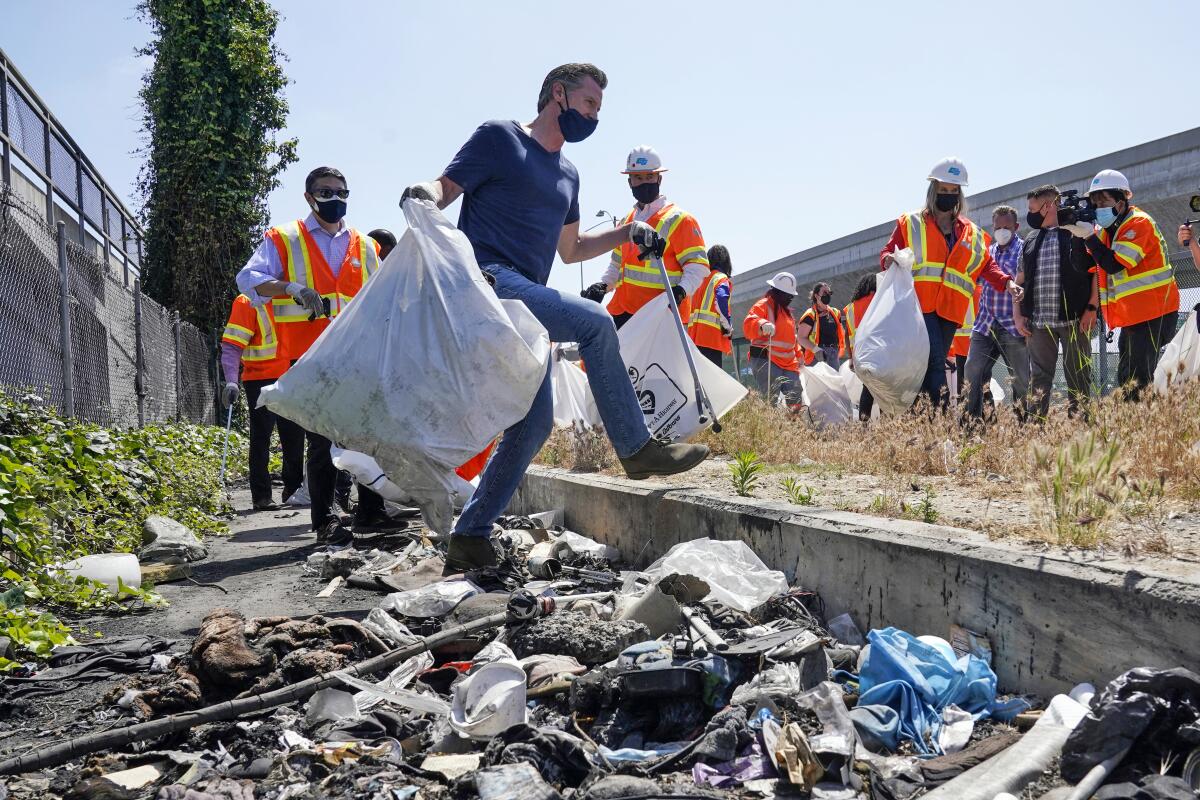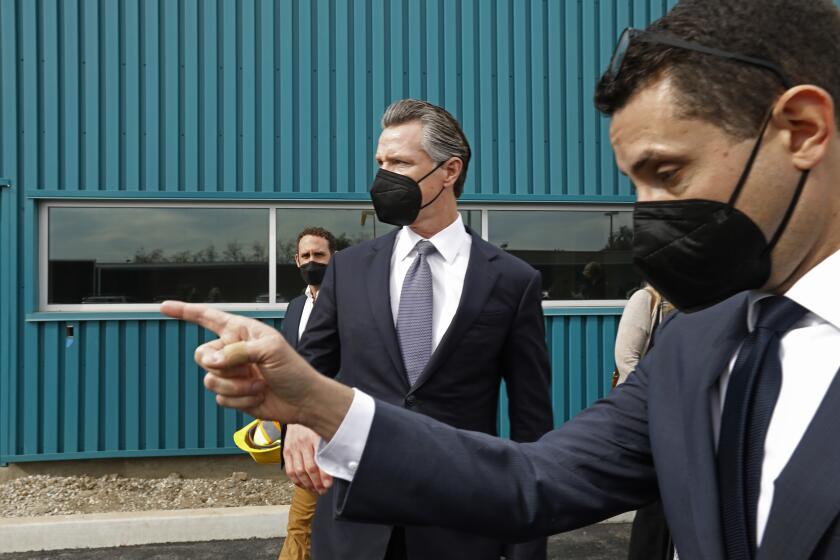In governor’s race, challengers attack Newsom’s record on homelessness

- Share via
SACRAMENTO — Even as Gov. Gavin Newsom boasts of California’s economic resurgence after the COVID-19 lockdowns, the tens of thousands of Californians living on the streets offer a searing counterpoint — a nagging reminder of the human suffering that has become a central focus of the long-shot candidates hoping to deny the Democratic governor a second term in November.
So far, Newsom holds the upper hand, thanks to the spotlight afforded to an incumbent and a $25-million reelection war chest that could easily swamp his challengers. But those advantages could be diminished if the sight of ever-growing encampments leaves voters skeptical that the governor has made any significant progress to alleviate the state’s homelessness crisis, or at least has prevented it from growing worse.
Two of Newsom’s most vocal challengers — Republican state Sen. Brian Dahle of Bieber in Lassen County and Bay Area energy and homeless policy activist Michael Shellenberger, a Democrat turned independent — hope to tap into festering voter anger over homelessness, crime and other quality-of-life issues as a way to overcome Newsom’s enormous political advantages.
They have accused the governor of being beholden to the failed housing and homelessness policies of the far left. While ideologically different, both men are calling for a crackdown on homeless encampments and greater incentives for drug users and the mentally ill to receive treatment when provided housing.
“There’s no lack of money in California. I’ve never seen so much money in politics, but I’ve also never seen so many people unhappy with what the government’s doing at the same time,” said Dahle, referring to an estimated state budget surplus that could top $30 billion by next summer. “I think that people are waking up and realizing that we don’t have a money problem. We have a policy problem.”
Shellenberger blames California’s predicament on generous, no-strings-attached programs championed by the Newsom administration and liberal leaders of the state’s largest cities, including Los Angeles and San Francisco. Tent cities have turned into drug dens, he said, and housing is being provided to people regardless of whether they seek treatment for addiction or mental illness.
“The reason we have so many homeless people is because we spend so much money on homelessness,” said Shellenberger. “That’s how you created the problem. You advertise to every homeless drug addict and mentally ill person in the United States that they’re going to get a free home in Venice Beach and, if not, then they can just stay on Venice Beach and [its] open drug scene.”
Newsom and Democratic state lawmakers have poured $12 billion in state and federal money into efforts to ease California’s homelessness crisis, which he called a “disgrace” two years ago when promising that the issue would be the top priority of his administration. The efforts have led to 58,000 people being placed in shelters or housing since the outbreak of the pandemic under the state-funded Project Roomkey and Project Homekey, which bought hotels and other buildings to be converted into housing for those in need.
California’s governor is fast-tracking a plan to compel people into court-ordered treatment, but a lot of details are still in question.
In January, Newsom announced a proposed state budget calling for an additional $2 billion over a two-year period to boost efforts aimed at getting people out of encampments and into shelters while providing additional mental health services. His administration budgeted $50 million to clean up makeshift campsites and is now asking lawmakers to kick in an additional $500 million. Last month, Newsom proposed the creation of “care courts,” which would provide court-ordered mental illness and addiction treatment for the severely afflicted, an estimated 7,000 to 12,000 of the state’s homeless population.
Recent polls show that voters see little, if any, progress. They give the governor failing grades on the issue, making it among his greatest political vulnerabilities. Newsom is keenly aware of those frustrations.
“I can literally quantify 58,000 people that we got off the streets last year, and none of you would believe it,” he said in January when unveiling his budget. “I wouldn’t believe it. I see what you see. You’re like, ‘Give me a break.’”
In a February poll by UC Berkeley’s Institute of Governmental Studies, co-sponsored by The Times, two-thirds of registered voters said Newsom is doing a poor or very poor job addressing homelessness — an increase of 12 percentage points from 2020. Voters were almost evenly split over Newsom’s overall performance as governor.
Concerns about rising crime and the homelessness crisis emerged as the top issues driving voter dissatisfaction with Gov. Gavin Newsom.
“Things haven’t gotten better for him. It’s certainly the top issue in certain areas of the state, and until we start to see some progress, you’ll probably continue to be dragged down by it,” said Mark DiCamillo, director of the Berkeley poll.
The question is whether it will impact Newsom’s reelection campaign, DiCamillo said. None of Newsom’s challengers, including Dahle and Shellenberger, are well known to California voters, he said. They also lack the financial resources to quickly raise their political profile in a state where winning a gubernatorial campaign routinely cost tens of millions of dollars.
Dahle, a farmer from the Northern California town of Bieber who served 16 years as a county supervisor, remains sober about his prospects and is well aware that no Republican has won a statewide election in California since 2006. But he said Californians are fed up with rising homelessness and crime and are desperate for new leadership.
Dahle has called for an audit of homelessness programs while boosting rehabilitation and mental health services, including those offered by nonprofits and faith-based organizations. He favors building more shelters, speeding up the construction of affordable housing and imposing fewer construction limits under the landmark California Environmental Quality Act.
“The governor’s plan is to just throw money at this stuff,” Dahle said. “I’m a farmer. You can’t just throw seeds on the ground and expect them to grow.”
Shellenberger, who describes himself as a former progressive, supported the ouster of Newsom in the Sept. 14 recall election and ran for governor in 2018 as a Democrat, winning less than 1% of the primary vote. He argues that Newsom has made the homelessness crisis worse by failing to address the core issue: the need to require treatment for drug addicts and the mentally ill living on the streets.
“I think people got it wrong for so long, particularly viewing it as a housing problem,” he said. “I think we have a housing shortage. But I don’t think it’s a housing problem. I think it’s fundamentally an untreated mental illness and drug addiction problem, which makes it a broken healthcare system problem.”
Shellenberger’s idea is to create a statewide psychiatric and addiction care system called Cal Psych, which would take over as the primary provider of services now controlled by counties and cities. Shellenberger also wants to crack down on homeless encampments, which he describes as breeding grounds for drug use and lawlessness.
“If you’re using drugs in public, if you’re camping in public, you’re defecating in public, you should be warned. But if you’re refusing to comply or are multiple times arrested, [you should be] brought before a judge and offered treatment as the alternative to incarceration,” Shellenberger said.
He believes temporary shelter should be made available to everyone, but those seeking permanent housing must be required to seek treatment if they have addiction or mental health issues — a prerequisite Shellenberger says has been opposed by Newsom and other liberal politicians. In his 2021 book, “San Fransicko: Why Progressives Ruin Cities,” Shellenberger lays out the criticism in detail and rips Newsom for failing to deliver on his 2018 campaign promise to build 500,000 new units of housing annually for six straight years.
Jason Elliott, a Newsom advisor on housing and homelessness, said the governor has aggressively pushed local governments to create housing required under state law, even threatening legal action. He dismissed the idea of requiring homeless people to “earn their right to housing” by maintaining sobriety or forcing them into therapy, characterizing it as an archaic, cruel policy that was promoted by the administration of former President Trump.
“If you break your leg in America, we don’t tell you that you have to earn your way into crutches, right?” Elliott said. “Mental health is a disease, and like a broken leg, it is a medical condition. So let’s bring a little compassion to this work.”
Dr. Margot Kushel, a professor of medicine at UC San Francisco and director of the Benioff Homelessness and Housing Initiative, says the lack of affordable housing is central to the crisis. It’s no coincidence that California, with its high rents and home prices, is in such a dire situation, while more affordable states — where residents also have substance abuse and mental health problems — are much better off when it comes to homelessness, she said.
“California is in such bad shape because of 40 years or more of very bad policy decisions around housing that really put us in this position,” Kushel said. “We’re not going to get out of it quickly, no matter what anyone does.”
More to Read
Sign up for Essential California
The most important California stories and recommendations in your inbox every morning.
You may occasionally receive promotional content from the Los Angeles Times.












